Tag: Mozart
New England Symphonic Ensemble
At Carnegie Hall – not Lincoln Center, ahem! — for the New England Symphonic Ensemble program. It was an all choral line-up tonight, featuring Mozart’s Requiem, K. 626 as the highlight finale.
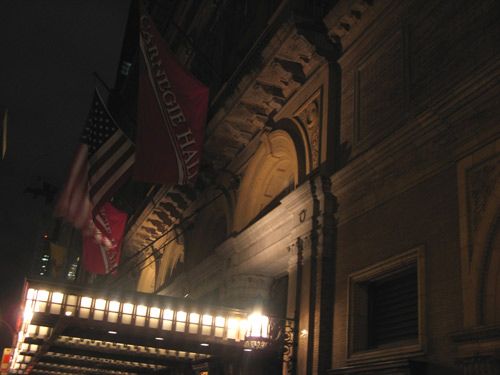
We had seats in the second tier center box, which was a perfect perch from which to take in the entire stage with its orchestra and hundreds of chorus members from five states. To start things off: George Frideric Handel’s “Sing Unto God” from his Judas Maccabeus, an oratorio written in 1746 — five years after Messiah. And then before the intermission break, Ralph Vaughan Williams’ Serenade to Music, which culls its lines from Act V of Shakespeare’s Merchant of Venice:
The man that hath no music in himself,/ Nor is not mov’d with concord of sweet sounds,/ Is fit for treasons, stratagems, and spoils;/ The motions of his spirit are dull as night,/ And his affections darks as Erebus:/ Let no such man be trusted.
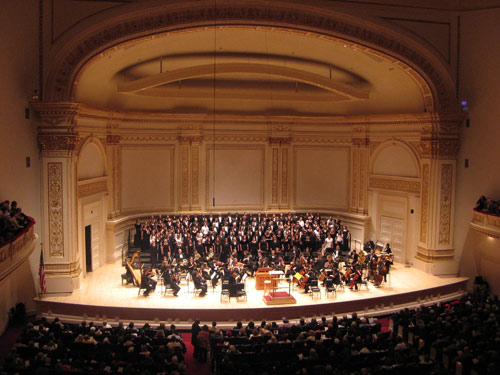
One distraction: although the program clearly requested that audience members hold their applause until after the final movement, we would invariably have to pause for the smatterings of claps at every break. Eh, whaddaya gonna do?
For the Requiem in D minor, a new set of choruses took the stage, many clad in navy choir robes. Mozart’s last composition is one of his most widely recognized works, not only for its music (which HYB posited as the only proof of the existence of God), but also for the mysterious circumstances surrounding the Requiem‘s commission, the debate over how much of the score is attributable to Mozart, and how much was later composed by his colleague Franz Xaver Süssmayr after Mozart’s death.
My first exposure to the score was in Amadeus. (Years later, though, my high school chorus learned excerpts of it for performance, including the rousing “Dies Irae“. And as I recall, the “Lacrimosa” was one of SS’s all-time favorite pieces of music.) That film went on to win eight Academy Awards, including best picture, and is responsible for cementing in many people’s minds several of the myths surrounding the Requiem (and of Mozart’s life, generally.) Foremost among these is the role of rival composer Antonio Salieri in commissioning the work, and ultimately hastening Mozart’s death.
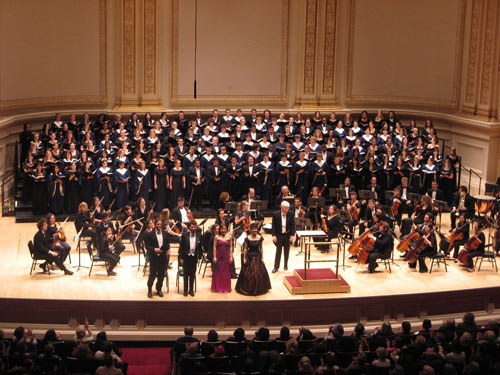
As I sat listening to the eminently moving music, it occurred to me that Amadeus, which recently played in New York as part of the Milos Forman retrospective at the MoMA, was released in 1984 — which is to say: before most of the members of these high school and college chorus members were even born.
Falco’s “Rock Me Amadeus” was released the following year, in 1985.
Die Zauberflöte
At the Metropolitan Opera House tonight with HYB for Die Zauberflöte (The Magic Flute). Mozart’s final opera is the tenth most frequently performed opera in North America. I’d seen a fairy-tale-like production (with Andrew Porter’s English translation) at the New York City Opera across the plaza a few years ago; this season, the Met brought back Broadway and film director Julie Taymor’s 2004 production.
Set in an imaginary Egypt, the action revolves around a prince and princess overcoming adversity to unite. Along the way, there is a bird-catcher, a high priest, a moor, serpents, beasts, assorted royal attendants and genii and perfunctory ordeals by water and fire. No ninjas, though. It’s all fairly ridiculous, but the music remains sublime. Taymor’s staging features an incredible variety of figures swirling the stage; I especially liked the flying birds, giant kite-like dancing bears and the magnificent star-shimmering Königin der Nacht (Queen of the Night). The puppet animals were created with the input of Michael Curry, who also designed the award-winning creatures for The Lion King on Broadway, adding to the feel of spectacle on the kaleidoscopic, mirror-lined stage.
Not everyone’s a fan, though. Three years ago, New York Times critic Anthony Tommasini found Taymor’s production to be a mishmash of imagery, so cluttered with puppets, flying objects and fire-breathing statues that it overwhelmed Mozart’s music. His review this year focused on 36-year old German soprano Diana Damrau‘s impressive turns in her dual roles as the Queen of the Night and Pamina during the Met’s Die Zauberflöte run–a feat never before attempted at the opera house in a single season. This night Damrau inhabited the ingénue role; after this season, she will be retiring her Queen, one of the most difficult roles in the standard coloratura repertoire, with its two relatively short, but flashy arias “O zittre nicht, mein lieber Sohn” (Oh, tremble not, my beloved son) and the famously treacherous “Der Hölle Rache kocht in meinem Herzen” (The vengeance of Hell boils within my heart). The role, which amounts to just about twelve minutes of stage time, demands five staggeringly high F6’s–a fourth above “Soprano C,” and the highest note in the standard operatic range.
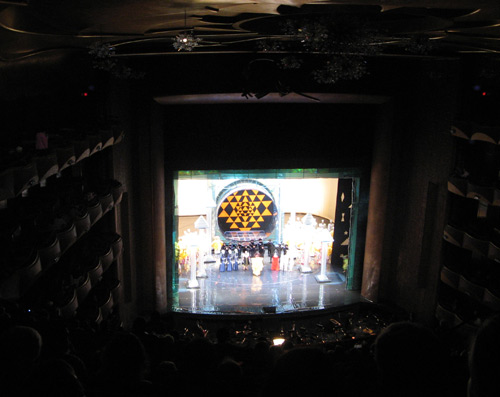
Intermission in the Eleanor Belmont Room, a club used by members of the Metropolitan Opera Guild. We were there courtesy of SYB’s guest passes; the private lounge is otherwise only made available for pre-performance dining and intermission coffee and cocktail service for Contributing Level (or higher) Met Guild donors.
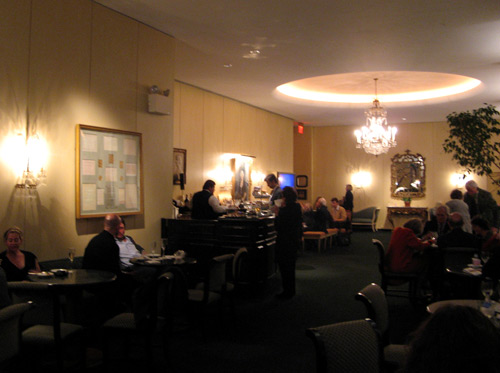
On the Plaza, “it’s sew time”: the launch party for Season 4 of Bravo’s Project Runway. Ever since Top Chef ended its run last month, Project Runway has become my favorite reality show on television right now. The Daily News breaks down the reasons for Runway’s superiority, including “Contestants actually have to do things that take – gasp! – talent,” (the “talent” being something other than, say, “knowing how to snag a man” or “losing 80 pounds“), “It’s just so incredibly gay,” and finally “Who are we kidding? Can there ever really be a full explanation for love?”
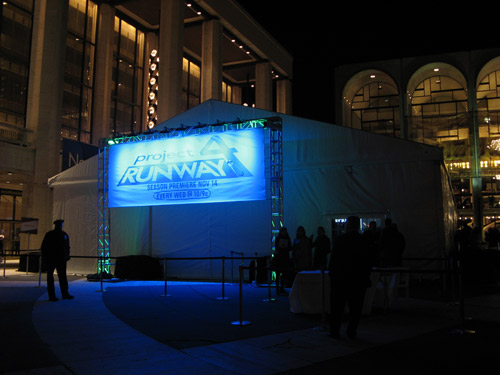
| S | M | T | W | T | F | S |
|---|---|---|---|---|---|---|
| 1 | 2 | 3 | 4 | 5 | ||
| 6 | 7 | 8 | 9 | 10 | 11 | 12 |
| 13 | 14 | 15 | 16 | 17 | 18 | 19 |
| 20 | 21 | 22 | 23 | 24 | 25 | 26 |
| 27 | 28 | 29 | 30 | |||
Search
Popular Tags
Categories
Archive
- July 2010
- July 2009
- January 2009
- November 2008
- September 2008
- August 2008
- July 2008
- June 2008
- May 2008
- April 2008
- March 2008
- February 2008
- January 2008
- December 2007
- November 2007
- October 2007
- September 2007
- August 2007
- July 2007
- June 2007
- May 2007
- April 2007
- March 2007
- February 2007
- January 2007
- December 2006
- November 2006
- October 2006
- September 2006
- August 2006
- July 2006
- June 2006